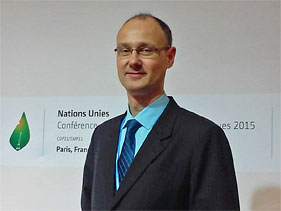December 12, 2015 is a date to remember. For the 1st time ever, 195 countries were finally able to approve a truly global climate agreement. In doing so, we have moved away from the entrenched and divided world under the Kyoto protocol, which applied to industrialized nations only. With the adoption of the Paris Agreement, all countries – developed and undeveloped – have agreed to do what they can to contribute to the common purpose. This is not only a equitable way to move forward, it underscores the principle of pursuing common but differentiated responsibilities.
The goal of the landmark framework agreement is to limit the increase in the global average temperature to well below 2°C above pre-industrial levels and to pursue “efforts to limit the temperature increase to 1.5°C.” This reference to 1.5°C demonstrates the negotiating power of vulnerable countries, who are already experiencing climate change impacts.
Unfortunately, the individual country climate action plans submitted, or Intended National Determined Contributions (INDCs), are still likely to increase the temperature by almost 3°C.
The “Fossil of the Day”
While Saudi Arabia won 4 fossil of the day awards for blocking negotiations, many countries eventually joined the “high ambition coalition,” which was initiated by the European Union along with 79 developing and industrialized countries. Unlikely candidates such as the United States and Brazil finally joined in, proving that it is possible to bring widely varying national interests to a consensus.
Better than expected
Critics say it will be impossible to enforce the agreement and that 1.5°C will be very difficult to achieve. Even so, the Paris Agreement puts the earth on a new trajectory. It calls nations to come back to the table every 5 years and encourages them to be more ambitious. The outcome of COP 21 sends a strong signal to businesses and investors that there is but one way forward. Allianz is already taking bold steps to integrate climate change into its core business. We have also joined the Portfolio Decarbonization Coalition (PDC), a group of investors committed to aligning their portfolios with the low-carbon economy.
The Paris Agreement on Climate Change is ambitious and balanced. To be honest, I didn’t dare hope for such a positive outcome. Not when the draft version of the agreement contained 916 brackets and 91 options, highlighting the differences between the different participants’ viewpoints. The way forward is clear. I firmly believe that the time has come to anticipate unequivocal change and act accordingly by finding solutions that protect and care for our customers as we transition to a low carbon economy.
